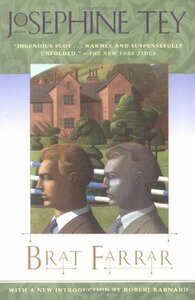Take a photo of a barcode or cover
Libro con ritmo pausado pero con giro sorprendente al final. Muy recomendable!!
This book was a delight. Entirely its own within the forms of the genre. I had so much affection for the characters and the ending was very satisfying.
Not as outstanding as the Franchise affair but still excellent.
I think this is what they call a cozy mystery. I enjoyed it, mostly, I think, because I liked Brat so well. A nice read after some of the grim stuff I've been piling on this month.
3.5 Slightly offbeat sort of mystery about an attempt to claim an inheritance through impersonation of a dead person. Good characterizations, and it ended the way I wanted it to. (Which of course annoyed me, because I hate to predict outcomes, but if it had ended any other way I would have been mad, so there is no pleasing me, is there? Pay me no mind.)
I liked this a lot. The stakes were low but the intrigue was still quite thick. The set up was interesting and an English Manor house is such a traditional setting for a mystery that it all felt quite cozy and relaxing.
I was really enjoying the suspense built up in this book, but felt let down and disappointed by the ending. I thought the big "reveal" would be much more sensational than it actually was. It was still an enjoyable read but not a great one.
Library.
As mysteries go, I can't say I found this satisfying. Tey doesn't give the details or even the solution very clearly. There is a mystery, and it is solved, but it seems almost incidental to the book. The story is a bit dated and wouldn't get off the ground today what with DNA testing to clear up the "is he or isn't he" speculation of Brat's ancestry.
As novels go, I found this very satisfying. Tey writes a beautiful piece of literature; the language is luscious with lines like "You perishing marvel" tossed in with abandon. With beautiful allusions - like the pit of Dothan where Joseph was thrown by his brothers - that you know you know but can't quite catch the details but don't want to stop to look up, Tey moves the story along. She keeps the reader guessing at Brat's identity while clearly telling you. I was going through all sorts of mental contortions trying to figure out the who and why and how.
I think Tey was playing with the idea of being content with your lot here. I caught her mentioning it a few times (it sticks out as the answer to a catechism question). Very few of the characters in this novel were content with their lot ... perhaps Eleanor and Mr. and Mrs. Peck (the rector and his wife). Some were resigned, some were seeking a better lot, some were itching for more even than that. In fact, it was restful to the mind when the reader finds a place where people were content:
I always get caught in my reading by references to Christianity and education and life, so have to note some quotes:
and
As mysteries go, I can't say I found this satisfying. Tey doesn't give the details or even the solution very clearly. There is a mystery, and it is solved, but it seems almost incidental to the book. The story is a bit dated and wouldn't get off the ground today what with DNA testing to clear up the "is he or isn't he" speculation of Brat's ancestry.
As novels go, I found this very satisfying. Tey writes a beautiful piece of literature; the language is luscious with lines like "You perishing marvel" tossed in with abandon. With beautiful allusions - like the pit of Dothan where Joseph was thrown by his brothers - that you know you know but can't quite catch the details but don't want to stop to look up, Tey moves the story along. She keeps the reader guessing at Brat's identity while clearly telling you. I was going through all sorts of mental contortions trying to figure out the who and why and how.
I think Tey was playing with the idea of being content with your lot here. I caught her mentioning it a few times (it sticks out as the answer to a catechism question). Very few of the characters in this novel were content with their lot ... perhaps Eleanor and Mr. and Mrs. Peck (the rector and his wife). Some were resigned, some were seeking a better lot, some were itching for more even than that. In fact, it was restful to the mind when the reader finds a place where people were content:
It was a pleasant, civilised little town, with a minister, some fine old inns, a High Street both broad and gay, and no self-consciousness whatsoever. The farmers who brought their wares to its markets would have annoyed Mr. Macallan exceedingly by their content with their lot, and their evident unawareness that there were other worlds to conquer. An aire of well-being came off the Bures pavement like reflected sunlight. Bad years there might be, for both tradespeople and farmers, but that was a risk that was incidental in a life that was satisfying and good. (p220, emphasis mine)
I always get caught in my reading by references to Christianity and education and life, so have to note some quotes:
Bee waited till Evensong would be over, and then walked across the fields to the Rectory. Ostensibly, she was going to tell them the news; actually she was going to pour out her troubles to George Peck. When George could withdraw his mind sufficiently from the classic world to focus it on the present one, he was a comfortable person to talk to. Unemotional and unshockable. Bee supposed that an intimate acquaintance with classic on-goings, topped-off with a cure of souls in a country parish, had so conditioned him to shocks that he had long ago become immune from further attack. Neither ancient iniquity nor modern English back-sliding surprised him. So it was not to Nancy, her friend, that she was taking her unquiet heart, but to the Rector. Nancy would wrap her round with warm affection and sympathy, but it was not sympathy she needed; it was support. Besides if she was to find understanding it would not be with Nancy, who had forgotten Patrick's very existence, but with George Peck, who would most certainly remember the boy he had taught. (p78)
and
"What kind of school?"
"A school for dodgers."
"Dodgers?"
"Yes. Anyone who loathes hard work and has a parent with enough money to pay the fees makes a beeline for Clare. No one is forced to learn anything at Clare. Not even the multiplication table. The theory is that one day you'll feel the need of the multiplication table and be seized with a mad desire to acquire the nine-times. Of course, it doesn't work out like that at all."
"Doesn't it?"
"Of course not. No one who could get out of the nine-times would ever dream of acquiring it voluntarily."
"And if they don't do lessons what do they do all day?"
"Express their personalities. They draw things; or make things; or whitewash the coach-house; or dress up ... I teach some of them to ride. They like that. Riding, I mean. I think they are so bored with easy things that they find something a little difficult simply fascinating. But of course it has to be something out of the ordinary. The difficult thing, I mean. If it was a difficulty that everyone was supposed to overcome they wouldn't be interested. That would bring them down to a common level of you and me. They wouldn't be 'different' any longer." (p 96)
Discovered this book years ago and re-read it periodically. It's a bit dated now, but don't let that stop you from enjoying the plot and its twists. The characters are well described, so you do get a sense of them, and the story is interesting.
Josphine Tey writes without pretense, so clear that it almost reads like a children's story but with weightier subject matter.




